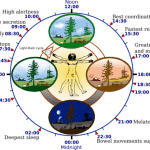

Though AD is not a normal part of getting old, survey on Alzheimers disease and sleep has shown that its risk goes up with ages. Majority of the AD patients are usually diagnosed at age 60. If you are not diagnosed by age 60, further Alzheimers disease and sleep research shows that your risk of acquiring the disease doubles up every 5 years after age 60. Since AD primarily affects the brain from where sleep is also controlled, sleep disorder is the main characteristic of the disease.
In its initial stages, memory loss is very low only. But in the advanced stage, the persons lose the ability to understand the conversation and respond according to their environment. It is also one of the leading cause of death.
Alzheimers disease and Sleep: Changes in Sleep
Difficulty in Sleeping
Alzheimers disease and sleep research at the National Sleep Foundation (NSF) has shown that AD patients stay longer at night before catching sleep. In addition, even after catching sleep, they wake up more often than other old healthy people at the same age. Alzheimers disease and sleep brain wave study has shown that brain wave activity in both REM and N-REM stages of sleep is decreased.
Shifts in Sleep-wake Cycle
Unable to sleep at night, AD patients find it difficult to stay awake during the day. In the late afternoon, they become agitated and often catch some sleep at this time. Alzheimers disease and sleep experts call this effect sundowning.
In advanced AD, patient spend 40% of their day awake and most of their day sleeping. Alzheimers disease and sleep studies have identified a few cases where the sleep-wake cycle is revered completely. This means that the patients stays awake at night and sleeps all day.
Alzheimers Disease and Sleep: Medical Factors Contributing to Sleep Problems
Depression
Needless to say, losing your memory after 60 years of having good memory can be traumatizing. Most AD patients are usually depressed. The intensity of depression usually increases as more ability to remember is lost.
Restless Legs Syndrome (RLS)
RLS is an independent sleep disorder. Alzheimers disease and sleep studies have shown that the prevalence of RLS is high in Alzheimers disease since the brain is damaged. RLS patients experience a “tingling” effect in their legs making it virtually impossible to sleep. What’s more?! The “tingling” effect increase in evening and is most severe at night.
Drugs for Treatment of Alzheimers Disease
The drugs used to treat AD and the conditions related to it usually result sleep difficulties.
Remedies for Alzheimers Disease and Sleep Disorders
Regular Sleep Schedule
As you have read, in some case of AD the sleep-wake cycle is revered. To avoid this reversal, maintaining a regular sleep-wake cycle is vital. Since the patient is usually forgetful, the caregiver should try to put the patient to sleep at the same time everyday. During the day, the patient should be kept awake by keeping them busy.
Exercise
When you are tired, sleep is quick to achieve and deeper. Try to make the patient to perform activities that they use to enjoy before the disease. However, the exercises should not be done too close to bedtime.
